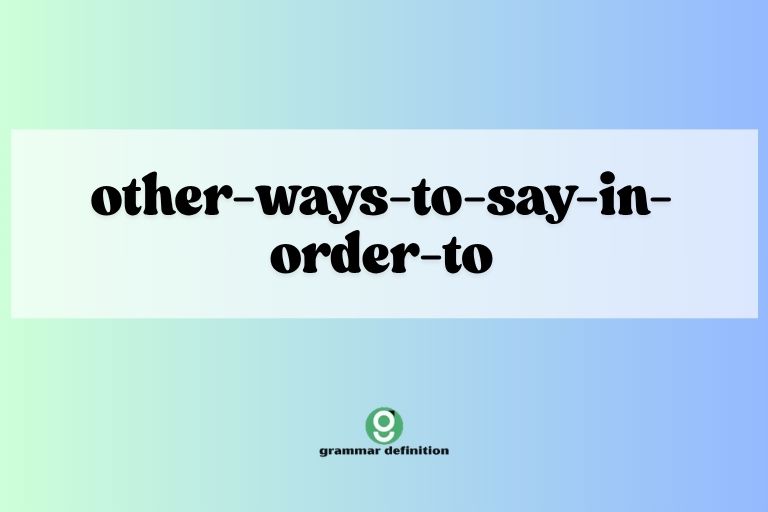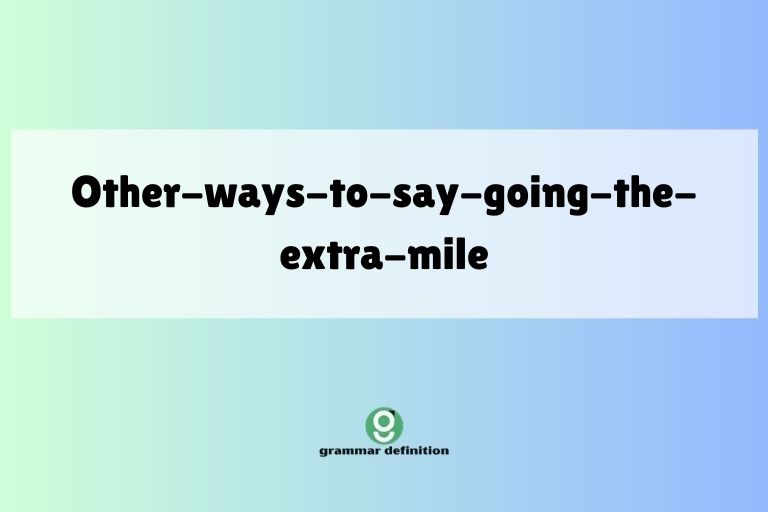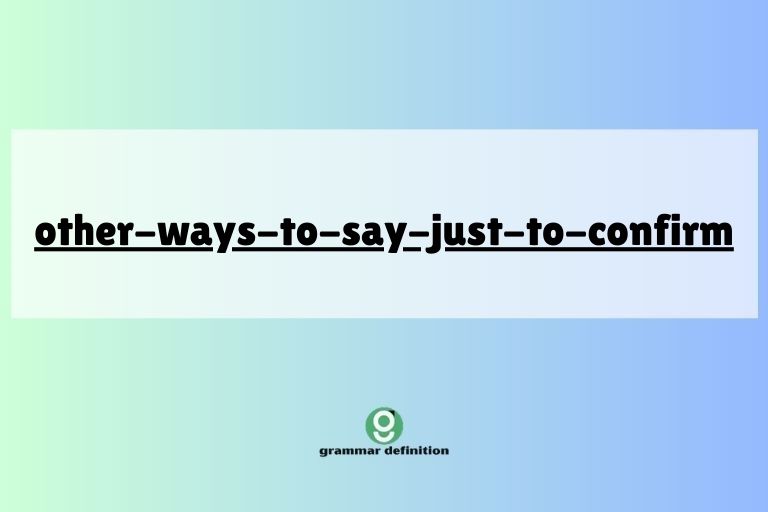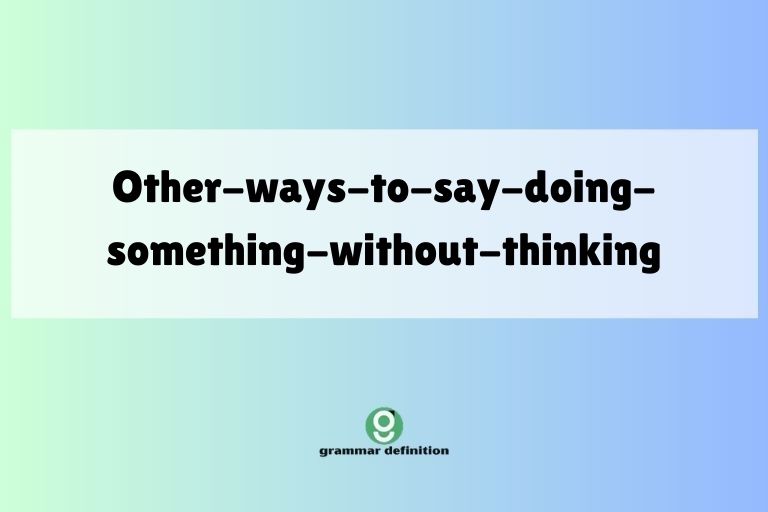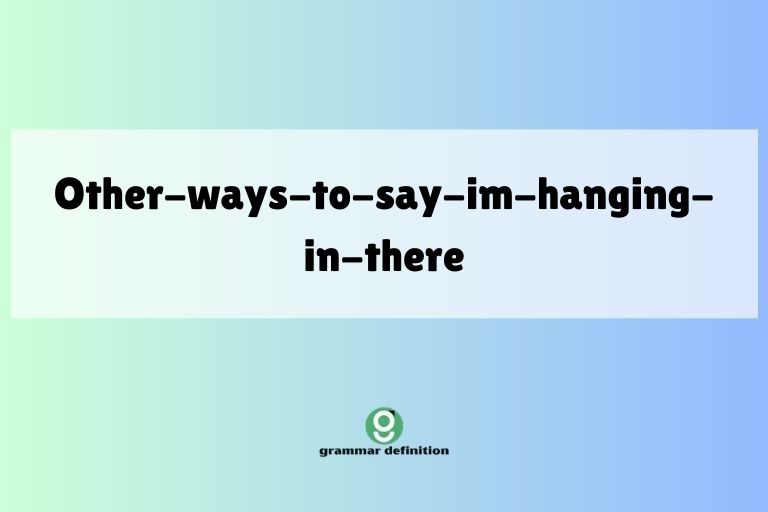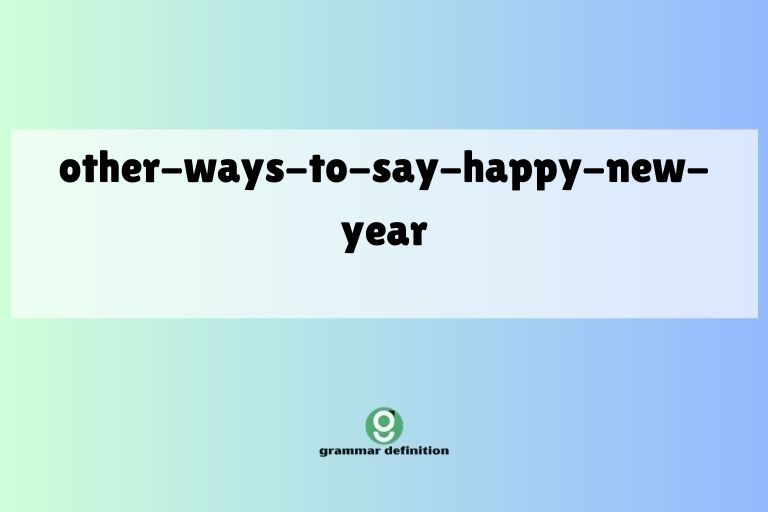Beyond “I Would Love To”: Diverse Ways to Express Enthusiasm
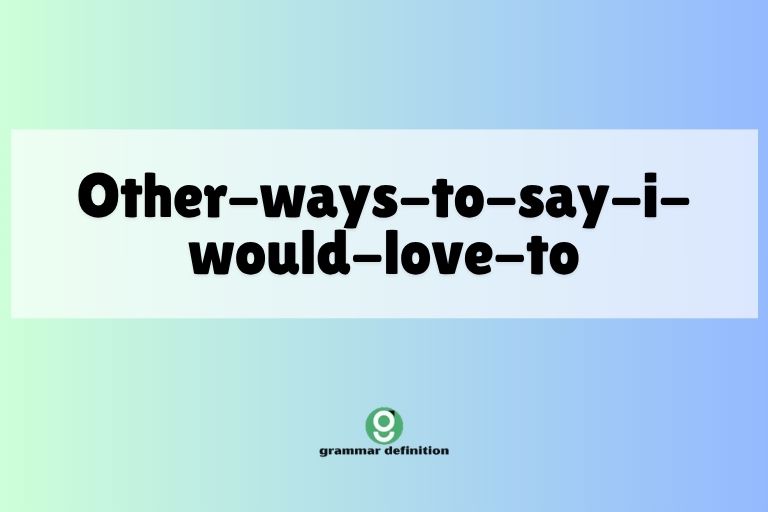
Expressing desire and enthusiasm is crucial in effective communication. While “I would love to” is a perfectly acceptable phrase, over-reliance on it can make your speech sound repetitive.
This article explores a wide range of alternative expressions that convey similar meanings with varying degrees of formality, intensity, and nuance. Understanding these alternatives will enrich your vocabulary, enhance your communication skills, and allow you to express yourself more precisely and engagingly.
This guide is beneficial for English language learners of all levels, from beginners seeking basic alternatives to advanced speakers aiming for more sophisticated expression.
This article will cover definitions, structural breakdowns, usage rules, examples, common mistakes, practice exercises, and frequently asked questions. By the end of this guide, you will be equipped with a versatile toolkit of phrases to express your willingness and eagerness in any situation.
Table of Contents
- Definition: Expressing Desire and Enthusiasm
- Structural Breakdown of Alternative Phrases
- Types and Categories of Expressions
- Examples
- Usage Rules
- Common Mistakes
- Practice Exercises
- Advanced Topics
- FAQ
- Conclusion
Definition: Expressing Desire and Enthusiasm
Expressing desire and enthusiasm involves conveying your willingness, eagerness, or strong interest in participating in an activity, accepting an offer, or agreeing to a proposal. This can range from a simple agreement to a passionate declaration of interest.
The choice of expression depends heavily on the context, your relationship with the person you’re speaking to, and the level of formality required.
These expressions can be classified based on several factors:
- Formality: Formal expressions are suitable for professional or official settings, while informal expressions are appropriate for casual conversations with friends and family.
- Intensity: Some expressions convey a stronger sense of enthusiasm than others.
- Politeness: Some expressions are more polite and respectful, particularly when addressing someone of higher status or authority.
- Conditionality: Some expressions imply a condition or reservation, while others express unconditional willingness.
The function of these expressions is to:
- Indicate agreement or acceptance.
- Convey enthusiasm and positive feelings.
- Build rapport and strengthen relationships.
- Encourage further interaction or collaboration.
Structural Breakdown of Alternative Phrases
Many alternatives to “I would love to” follow similar grammatical structures, often involving modal verbs, adjectives, or idiomatic phrases. Understanding these structures will help you create your own variations and adapt them to different situations.
Here are some common structural elements:
- Modal Verbs: Modal verbs like would, will, should, could, and might are often used to express willingness, possibility, or obligation.
- Adjectives: Adjectives like happy, pleased, eager, delighted, and willing can be used to describe your feelings about participating.
- Verbs of Desire: Verbs like want, desire, enjoy, and appreciate can be used to express your interest in something.
- Idiomatic Phrases: Idiomatic phrases like I’m all for it, count me in, and I’m game add color and personality to your speech.
- Conditional Clauses: Conditional clauses (using if or provided that) can be used to express willingness subject to certain conditions.
A basic structure often follows this pattern: Subject + Verb (expressing desire) + to + Verb (action). For example: I am eager to participate.
Types and Categories of Expressions
The alternatives to “I would love to” can be categorized based on their formality, intensity, and politeness.
Formal Expressions
These expressions are appropriate for professional settings, formal events, or when addressing someone you don’t know well or who is in a position of authority. They often use more sophisticated vocabulary and grammatical structures.
Examples include:
- I would be delighted to…
- I would be pleased to…
- I am most willing to…
- I would be honored to…
- I am at your service.
Informal Expressions
These expressions are suitable for casual conversations with friends, family, or close colleagues. They often use simpler vocabulary and more relaxed grammar.
Examples include:
- I’d love to!
- Sounds great!
- Sure, I’m in!
- Count me in!
- I’m game!
Enthusiastic Expressions
These expressions convey a strong sense of excitement and eagerness. They are suitable for situations where you want to express your genuine enthusiasm.
Examples include:
- I’m thrilled to…
- I’m so excited to…
- I can’t wait to…
- That sounds fantastic!
- I’m all for it!
Polite Expressions
These expressions are used to show respect and consideration, particularly when addressing someone of higher status or when making a request.
Examples include:
- I would be happy to assist.
- If it’s not too much trouble, I would be glad to…
- I would be pleased to offer my assistance.
- I am available to help in any way I can.
- I would be honored to accept your invitation.
Conditional Expressions
These expressions indicate willingness subject to certain conditions. They are useful when you want to express interest but need to clarify certain details first.
Examples include:
- If I am available, I would love to…
- Provided that I have the time, I would be happy to…
- As long as it doesn’t conflict with my other commitments, I would be delighted to…
- I’d be glad to, depending on the details.
- I am open to it, provided that…
Examples
This section provides a comprehensive list of examples, categorized for clarity.
Formal Examples
The following table provides formal alternatives to “I would love to”, suitable for professional or official settings. Each example is presented in a complete sentence to illustrate its proper usage.
| Formal Expression | Example Sentence |
|---|---|
| I would be delighted to… | I would be delighted to accept your invitation to the conference. |
| I would be pleased to… | I would be pleased to review the documents at your earliest convenience. |
| I am most willing to… | I am most willing to contribute my expertise to this project. |
| I would be honored to… | I would be honored to serve on the committee. |
| I am at your service. | Please let me know how I can assist you; I am at your service. |
| I am available to assist… | I am available to assist with the preparations for the upcoming event. |
| I am happy to oblige. | If you require any further information, I am happy to oblige. |
| I am agreeable to… | I am agreeable to the proposed changes to the contract. |
| It would be my pleasure to… | It would be my pleasure to present the keynote address. |
| I am quite willing to… | I am quite willing to take on the additional responsibilities. |
| I would be very grateful to… | I would be very grateful to receive further details about the opportunity. |
| I am eager to participate in… | I am eager to participate in the upcoming workshop. |
| I am keen to be involved in… | I am keen to be involved in the research project. |
| I am disposed to… | I am disposed to approve the request. |
| I am more than happy to… | I am more than happy to provide a reference for her. |
| I stand ready to… | I stand ready to assist in any way necessary. |
| I am prepared to… | I am prepared to take on the challenge. |
| I am ready and willing to… | I am ready and willing to contribute my time and effort. |
| I am pleased to offer my services. | I am pleased to offer my services to your organization. |
| I consent to… | I consent to the terms and conditions outlined in the agreement. |
| I concur with… | I concur with the decision to proceed with the project. |
| I accede to… | I accede to your request for an extension. |
| I give my assent to… | I give my assent to the proposal. |
| I am amenable to… | I am amenable to the suggested changes. |
| I am favorably inclined to… | I am favorably inclined to support your application. |
| I am disposed to agree to… | I am disposed to agree to the terms of the settlement. |
| I am inclined to… | I am inclined to accept the offer. |
Informal Examples
The following table presents informal alternatives to “I would love to,” suitable for casual conversations with friends and family. These examples use simpler language and a more relaxed tone.
| Informal Expression | Example Sentence |
|---|---|
| I’d love to! | “Want to grab coffee later?” “I’d love to!” |
| Sounds great! | “We’re going to the beach this weekend.” “Sounds great!” |
| Sure, I’m in! | “Anyone want to join for a movie night?” “Sure, I’m in!” |
| Count me in! | “We’re organizing a volunteer event.” “Count me in!” |
| I’m game! | “Thinking of trying a new restaurant.” “I’m game!” |
| Totally! | “Want to go hiking tomorrow?” “Totally!” |
| Absolutely! | “Fancy a pizza tonight?” “Absolutely!” |
| For sure! | “Are you coming to the party?” “For sure!” |
| Yeah, sounds fun! | “We’re planning a karaoke night.” “Yeah, sounds fun!” |
| I’m up for it! | “Thinking of going camping.” “I’m up for it!” |
| Let’s do it! | “Shall we start the project now?” “Let’s do it!” |
| I’m on board! | “We need someone to help with the decorations.” “I’m on board!” |
| Why not! | “Want to try that new ice cream place?” “Why not!” |
| That’s a plan! | “So, we’re meeting at 7?” “That’s a plan!” |
| I’m down! | “Anyone want to go to the concert?” “I’m down!” |
| Sweet! | “I got us tickets to the game!” “Sweet!” |
| Awesome! | “We’re having a barbecue this weekend.” “Awesome!” |
| Cool! | “I made a reservation at the new Italian place.” “Cool!” |
| Alright! | “We’re starting the game now.” “Alright!” |
| Perfect! | “I’ll pick you up at 8.” “Perfect!” |
| Sounds like a plan! | “We’ll meet at the coffee shop at 10 AM.” “Sounds like a plan!” |
| Great idea! | “How about we go for a bike ride?” “Great idea!” |
| I’m totally in! | “We’re organizing a beach cleanup event.” “I’m totally in!” |
| Yes, please! | “Would you like some more cake?” “Yes, please!” |
| You bet! | “Are you coming to the party?” “You bet!” |
Enthusiastic Examples
This table contains expressions that convey a strong sense of excitement and eagerness, perfect for situations where you want to show genuine enthusiasm.
| Enthusiastic Expression | Example Sentence |
|---|---|
| I’m thrilled to… | I’m thrilled to be a part of this amazing project. |
| I’m so excited to… | I’m so excited to see you all at the reunion! |
| I can’t wait to… | I can’t wait to go on vacation! |
| That sounds fantastic! | “We’re going to a concert.” “That sounds fantastic!” |
| I’m all for it! | “Should we try skydiving?” “I’m all for it!” |
| I’m absolutely delighted to… | I’m absolutely delighted to accept this award. |
| I’m over the moon to… | I’m over the moon to hear the good news! |
| I’m ecstatic to… | I’m ecstatic to be invited to the wedding. |
| That sounds amazing! | “We’re going on a cruise.” “That sounds amazing!” |
| I’m pumped to… | I’m pumped to start the new job! |
| I’m beyond excited to… | I’m beyond excited to travel to Europe. |
| I’m buzzing to… | I’m buzzing to see my favorite band perform. |
| I’m super excited to… | I’m super excited to try the new restaurant. |
| I’m really looking forward to… | I’m really looking forward to the weekend getaway. |
| I’m eagerly anticipating… | I’m eagerly anticipating the release of the new movie. |
| I’m dying to… | I’m dying to try that new coffee shop. |
| I’m itching to… | I’m itching to get started on this project. |
| I’m stoked to… | I’m stoked to go surfing tomorrow. |
| I’m thrilled at the prospect of… | I’m thrilled at the prospect of working with you. |
| I’m jumping at the chance to… | I’m jumping at the chance to travel to Italy. |
| I’m bursting with excitement to… | I’m bursting with excitement to share the news with you. |
| I’m on cloud nine to… | I’m on cloud nine to have been selected for this opportunity. |
| I’m tickled pink to… | I’m tickled pink to have been invited to the gala. |
| I’m in seventh heaven to… | I’m in seventh heaven to be spending the weekend with my family. |
| I’m walking on air to… | I’m walking on air to have finally achieved my goal. |
Polite Examples
This table provides polite alternatives to “I would love to,” showing respect and consideration, especially when addressing someone of higher status or making a request.
| Polite Expression | Example Sentence |
|---|---|
| I would be happy to assist. | I would be happy to assist with the arrangements for the meeting. |
| If it’s not too much trouble, I would be glad to… | If it’s not too much trouble, I would be glad to proofread your document. |
| I would be pleased to offer my assistance. | I would be pleased to offer my assistance in resolving this issue. |
| I am available to help in any way I can. | Please let me know if you need anything; I am available to help in any way I can. |
| I would be honored to accept your invitation. | I would be honored to accept your invitation to the dinner party. |
| I am happy to help in any way possible. | I am happy to help in any way possible to ensure the success of the event. |
| I would be delighted to lend a hand. | I would be delighted to lend a hand with the decorations. |
| I am at your disposal. | If you require any further assistance, I am at your disposal. |
| I would be most grateful to assist. | I would be most grateful to assist in the research project. |
| I am more than willing to help. | I am more than willing to help with the fundraising efforts. |
| I would be pleased to contribute my time. | I would be pleased to contribute my time to the volunteer organization. |
| I am happy to volunteer my services. | I am happy to volunteer my services for the community event. |
| I would be honored to participate. | I would be honored to participate in the ceremony. |
| I am happy to provide any support you need. | I am happy to provide any support you need to complete the project. |
| I would be pleased to offer my expertise. | I would be pleased to offer my expertise on the matter. |
| I am happy to provide any assistance required. | I am happy to provide any assistance required to ensure the smooth operation of the event. |
| I would be honored to be a part of it. | I would be honored to be a part of this important initiative. |
| I am happy to offer my full support. | I am happy to offer my full support to the cause. |
| I would be most willing to contribute. | I would be most willing to contribute to the success of the project. |
| I am happy to provide my input. | I am happy to provide my input on the design. |
| If you need any assistance, please do not hesitate to ask. | If you need any assistance, please do not hesitate to ask, I am happy to help. |
| I am happy to be of service. | I am happy to be of service in any way possible. |
| I would be pleased to attend. | I would be pleased to attend the conference. |
| I would be honored to be considered. | I would be honored to be considered for the position. |
| I am happy to provide any necessary information. | I am happy to provide any necessary information to assist with your decision. |
Conditional Examples
This table illustrates conditional alternatives to “I would love to,” useful when expressing interest but needing to clarify certain details or conditions.
| Conditional Expression | Example Sentence |
|---|---|
| If I am available, I would love to… | If I am available, I would love to join you for dinner. |
| Provided that I have the time, I would be happy to… | Provided that I have the time, I would be happy to help you move. |
| As long as it doesn’t conflict with my other commitments, I would be delighted to… | As long as it doesn’t conflict with my other commitments, I would be delighted to attend the event. |
| I’d be glad to, depending on the details. | “Can you help me with this project?” “I’d be glad to, depending on the details.” |
| I am open to it, provided that… | I am open to it, provided that we can agree on the terms. |
| If the schedule allows, I would be thrilled to… | If the schedule allows, I would be thrilled to participate in the workshop. |
| Assuming I can get the time off, I’d be happy to… | Assuming I can get the time off, I’d be happy to join you on vacation. |
| If I’m not already booked, I’d be delighted to… | If I’m not already booked, I’d be delighted to help you with the presentation. |
| Provided there are no unforeseen circumstances, I would be pleased to… | Provided there are no unforeseen circumstances, I would be pleased to volunteer for the event. |
| If it fits into my budget, I would be excited to… | If it fits into my budget, I would be excited to go on the trip. |
| As long as it aligns with my goals, I would be happy to… | As long as it aligns with my goals, I would be happy to contribute to the project. |
| If the opportunity arises, I would be thrilled to… | If the opportunity arises, I would be thrilled to work with you. |
| Provided that the conditions are favorable, I would be delighted to… | Provided that the conditions are favorable, I would be delighted to invest in the company. |
| If I can make the necessary arrangements, I would be pleased to… | If I can make the necessary arrangements, I would be pleased to attend the conference. |
| As long as I have the resources, I would be happy to… | As long as I have the resources, I would be happy to support the initiative. |
| If it’s something I can manage, I would be glad to… | If it’s something I can manage, I would be glad to take on the task. |
| Provided that it’s within my capabilities, I would be happy to… | Provided that it’s within my capabilities, I would be happy to assist with the project. |
| If it’s something I’m interested in, I would love to… | If it’s something I’m interested in, I would love to learn more about it. |
| As long as it’s feasible, I would be happy to… | As long as it’s feasible, I would be happy to implement the plan. |
| If it aligns with my values, I would be delighted to… | If it aligns with my values, I would be delighted to support the cause. |
| Provided that I have a clear understanding of the requirements, I would be pleased to… | Provided that I have a clear understanding of the requirements, I would be pleased to contribute to the project. |
| If I can fit it into my schedule without compromising other commitments, I would be happy to… | If I can fit it into my schedule without compromising other commitments, I would be happy to attend the meeting. |
| As long as I can ensure the quality of the work, I would be glad to… | As long as I can ensure the quality of the work, I would be glad to take on the assignment. |
| If I receive sufficient notice, I would be delighted to… | If I receive sufficient notice, I would be delighted to prepare a presentation. |
| Provided that the event is accessible to everyone, I would be happy to… | Provided that the event is accessible to everyone, I would be happy to participate. |
Usage Rules
Using alternatives to “I would love to” correctly involves understanding the nuances of each expression and applying them appropriately in different contexts. Here are some key rules to follow:
- Consider the formality of the situation: Choose formal expressions for professional settings and informal expressions for casual conversations.
- Match the intensity of your enthusiasm: Select expressions that accurately reflect how excited you are about the opportunity.
- Use polite expressions when appropriate: Show respect and consideration when addressing someone of higher status or when making a request.
- Be mindful of conditional clauses: Use conditional expressions when you want to express interest but need to clarify certain details first.
- Avoid overuse of any single expression: Vary your language to keep your speech engaging and avoid sounding repetitive.
- Ensure grammatical correctness: Pay attention to subject-verb agreement, tense, and other grammatical rules.
- Pay attention to non-verbal cues: Your tone of voice, facial expressions, and body language should match the expression you are using.
Exceptions: Some expressions may be acceptable in both formal and informal settings, depending on the specific context and your relationship with the person you are speaking to. For example, “Sounds great!” might be acceptable in a casual email to a colleague you know well, but it would be inappropriate in a formal presentation.
Common Mistakes
Learners often make mistakes when using alternatives to “I would love to.” Here are some common errors and how to avoid them:
| Incorrect | Correct | Explanation |
|---|---|---|
| I would be delight to go. | I would be delighted to go. | “Delight” is a noun; “delighted” is the adjective. |
| Sound great! I am. | Sounds great! I’m in. | “I’m in” is the correct idiomatic expression. |
| I am very exciting to go. | I am very excited to go. | “Exciting” describes something that causes excitement; “excited” describes the feeling. |
| If I will have time, I help. | If I have time, I will help. | Correct conditional sentence structure is required. |
| I am agree with you. | I agree with you. | “Agree” is the verb and doesn’t require “am” in this context. |
| I am happy for help. | I am happy to help. | The correct preposition is “to” when expressing intention. |
| I am looking forward for it. | I am looking forward to it. | The correct preposition is “to” after “looking forward.” |
| I can’t wait it. | I can’t wait for it. | The correct preposition is “for” after “can’t wait.” |
| I’m all for this! | I’m all for it! | The correct pronoun is “it” when referring to a general idea or proposal. |
| I would be please to assist you. | I would be pleased to assist you. | “Please” is an adverb or verb, but “pleased” is the correct adjective. |
Practice Exercises
Test your understanding with these practice exercises. Choose the best alternative to “I would love to” in each sentence, considering the context.
Exercise 1: Formal Situations
| Question | Options | Answer |
|---|---|---|
| The company invited you to speak at their annual conference. You want to accept politely. What do you say? | a) Sounds great! b) I would be honored to accept your invitation. c) I’m in! | b) I would be honored to accept your invitation. |
| Your boss asks if you can assist with a new project. How do you respond formally? | a) Sure, I’m game! b) I am available to assist with the project. c) Let’s do it! | b) I am available to assist with the project. |
| You are asked to review a colleague’s proposal. How do you express your willingness formally? | a) Cool! b) I would be pleased to review the proposal. c) Sounds like a plan! | b) I would be pleased to review the proposal. |
| You are invited to join a committee. What’s a formal way to accept? | a) Totally! b) I would be delighted to serve on the committee. c) Count me in! | b) I would be delighted to serve on the committee. |
| You are asked to provide your expertise on a matter. Respond formally: | a) Why not! b) I am happy to offer my expertise. c) I’m down! | b) I am happy to offer my expertise. |
| You receive a request for assistance with a complex task. Respond formally: | a) I’m on board! b) I am pleased to offer my services. c) Perfect! | b) I am pleased to offer my services. |
| A client asks if you can provide additional information. Respond formally: | a) Alright! b) I am happy to provide any necessary information. c) Sweet! | b) I am happy to provide any necessary information. |
| You are invited to a formal dinner. Accept politely with: | a) Awesome!
b) I would be honored to attend. c) Cool! |
b) I would be honored to attend. |
Exercise 2: Informal Situations
| Question | Options | Answer |
|---|---|---|
| A friend invites you to a movie night. How do you respond casually? | a) I am agreeable to attending. b) Sounds great! c) I would be honored to attend. | b) Sounds great! |
| Someone asks if you want to join them for coffee. What’s a casual response? | a) I am inclined to accept. b) Sure, I’m in! c) I would be delighted to. | b) Sure, I’m in! |
| Your friend suggests trying a new restaurant. How do you respond informally? | a) I would be pleased to consider the option. b) I’m game! c) I am disposed to agree. | b) I’m game! |
| A group of friends is planning a weekend getaway. You want to join. What do you say casually? | a) I am more than willing to participate. b) I’m up for it! c) I would be delighted to join. | b) I’m up for it! |
| Someone asks if you want to go hiking. Respond casually: | a) I would be pleased to consider your offer. b) Totally! c) I am happy to oblige. | b) Totally! |
| A friend invites you to a party. Respond informally: | a) I would be honored to attend. b) You bet! c) I am available to assist. | b) You bet! |
| Someone suggests watching a sports game together. Respond casually: | a) I would be happy to provide my input. b) Cool! c) I am disposed to agree. | b) Cool! |
| A friend asks if you’re free to hang out. Respond informally: | a) I am amenable to the suggestion. b) Let’s do it! c) I would be pleased to consider. | b) Let’s do it! |
Exercise 3: Enthusiastic Situations
| Question | Options | Answer |
|---|---|---|
| You’re invited to your dream job interview. How do you express your excitement? | a) I am amenable to attending. b) I’m thrilled to accept the invitation! c) I am at your service. | b) I’m thrilled to accept the invitation! |
| You get tickets to see your favorite band. How do you express your enthusiasm? | a) I am inclined to. b) I’m so excited to go! c) I would be pleased to. | b) I’m so excited to go! |
| You’re invited on an all-expenses-paid vacation. Respond with excitement: | a) I am disposed to agree. b) That sounds amazing! c) I am happy to oblige. | b) That sounds amazing! |
| You’re about to start a project you’re passionate about. Express your enthusiasm: | a) I am more than willing to participate. b) I’m pumped to start! c) I would be delighted to join. | b) I’m pumped to start! |
| You’re finally going to meet your idol. Express your excitement: | a) I would be pleased to consider your offer. b) I can’t wait to meet them! c) I am happy to help. | b) I can’t wait to meet them! |
| You’ve been offered an opportunity to travel the world. Express your enthusiasm: | a) I am available to assist. b) I’m beyond excited to travel! c) I am pleased to offer my services. | b) I’m beyond excited to travel! |
| You’re about to witness a historical event. Express your excitement: | a) I would be happy to provide my input. b) I’m bursting with excitement! c) I am disposed to agree. | b) I’m bursting with excitement! |
| You’re finally achieving a long-term goal. Express your enthusiasm: | a) I am amenable to the suggestion. b) I’m walking on air! c) I would be pleased to consider. | b) I’m walking on air! |
Advanced Topics
For advanced learners, exploring the subtleties of these expressions can further refine communication skills.
- Cultural Context: Understand how cultural norms influence the use of these expressions. Some cultures may prefer more formal language, while others are more casual.
- Regional Variations: Be aware of regional differences in language use. Certain expressions may be more common in specific areas.
- Subtleties of Tone: Master the art of conveying different shades of meaning through tone of voice and body language.
- Adapting to Audience: Tailor your language to suit the specific audience you are addressing.
- Using these expressions in writing: Written communication requires a different approach than spoken communication. Pay attention to clarity, conciseness, and tone.
FAQ
When is it appropriate to use formal expressions?
Formal expressions are appropriate in professional settings, formal events, or when addressing someone you don’t know well or who is in a position of authority. Examples include job interviews, business meetings, and interactions with superiors.
Can I use informal expressions in a business email?
It depends on your relationship with the recipient. If you have a close, informal relationship with the person, a casual expression might be acceptable.
However, in most business emails, it’s best to stick to more formal language.
How can I show enthusiasm without sounding insincere?
Be genuine and authentic in your expression. Use specific details to show that you are truly interested.
For example, instead of saying “That sounds amazing!”, you could say “That sounds amazing! I’ve always wanted to visit that city.”
What if I’m not sure which expression to use?
When in doubt, it’s always best to err on the side of formality. A polite and professional expression is usually a safe choice.
You can also observe how others communicate in similar situations and adapt your language accordingly.
Are there any expressions I should avoid altogether?
Avoid using slang or overly casual expressions in formal settings. Also, be careful with expressions that could be misinterpreted or offensive.
If you’re unsure about an expression, it’s best to avoid it.
Conclusion
Mastering alternatives to “I would love to” is a valuable skill that can enhance your communication in various settings. By understanding the nuances of formality, intensity, and politeness, you can choose the most appropriate expression for each situation.
This guide has provided a comprehensive overview of different expressions, usage rules, common mistakes, and practice exercises to help you expand your vocabulary and improve your communication skills. Remember to practice regularly and pay attention to the context to become proficient in using these expressions effectively.
With consistent effort, you can confidently express your willingness and enthusiasm in a way that is both engaging and appropriate.

